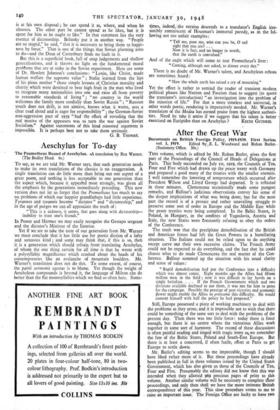Aeschylus for To-day
The Prometheus Bound of Aeschylus. *A translation by Rex Warner. (The Bodley Head. 6s.)
To say, as we are told Mr. Warner says, that each generation needs to make its own translations of the classics is no exaggeration. A single translation can do little more than bring out one aspect of a great poem, and nothing is less acceptable to one generation than the aspect which, because it appealed most strongly, Was given all the emphasis by the generations immediately preceding. This new version does not let us forget that the Prometheus has much to say on problems of which our happier grandfathers had little experience. Tyrannos and tyrannis become " dictator " and " dictatorship," and in the age of purges we can all appreciate the truth of :
" This is a sickness, it seems, that goes along with dictatorship— inability to trust one's friends."
In Power and Hermes we may easily recognise the Gestapo sergeant and the dictator's Minister of the Interior.
Yet if we are to take the taste of our generation from Mr. Warner we must conclude that it has little use for poetic diction of a lofty and sonorous kind and some may think that, if this is so, then it is a generation which should refrain fronf translating Aeschylus, of whom the one thing certain for all time is that he wrote with a polysyllabic magnificence which crashed about the heads of his contemporaries like an avalanche of mountain boulders. Mr. Warner's translation does not do this. To some extent, of course, the patrii sermonis egestas is to blame. Yet though the weight of Aeschylean compounds is beyond it, the language of Milton can do better than the flat monosyllables which we find so often here. Some-
times, indeed, the version descends to a translator's English irre- sistibly reminiscent of Housman's immortal parody, as in the fol- lowing not too unfair examples: " Tell me, poor me, who can you be, 0 sad sight that you are? ...
Now it is fact; and no longer in words, that the earth is convulsed."
And of the eagle which will come to tear Prometheus's liver : " Coming, although not asked, to dinner every day."
There is no doubt of Mr. Warner's talent, and Aeschylean echoes are sometimes heard: " Now the whole earth has raised a cry of mourning."
Yet the effect is rather to remind the reader of transient modern political phases like Nazism and Fascism than to suggest (to quote the translator's introduction) " art investigation into the problem of the injustice of life." For that a more timeless and universal, in other words poetic, rendering is imperatively needed. Mr. Warner's translation of the Medea has earned praise from the highest authori- ties. Need he take it amiss if we suggest that his talent is better
exercised on Euripides than on Aeschylus ? Kenn Guniain.


































 Previous page
Previous page